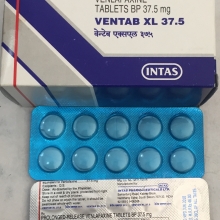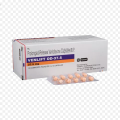Home / Categories / VENTAB XL-37.5MG

VENTAB XL-37.5MG
(10S*10T)
VENLAFAXINE -37.5MG
SEROTONIN NOR-EPINEPHRIN REUPTAKE INHIBITOR(SNRI)
INTAS PHARMACEUTICAL-ALTIMA DIVISION
Product Details
Venlafaxine
A to Z Drug Facts
| Venlafaxine |
| (VEN-luh-fax-EEN) |
| Effexor |
| Tablets |
| 25 mg |
| Tablets |
| 37.5 mg |
| Tablets |
| 50 mg |
| Tablets |
| 75 mg |
| Tablets |
| 100 mg |
| Effexor XR |
| Capsules, extended-release |
| 37.5 mg |
| Capsules, extended-release |
| 75 mg |
| Capsules, extended-release |
| 150 mg |
| Class: Antidepressant |
 Action Potentiates norepinephrine, serotonin, and dopamine neurotransmitter activity in CNS.
Action Potentiates norepinephrine, serotonin, and dopamine neurotransmitter activity in CNS.
 Indications Treatment of depression; generalized anxiety disorder (venlafaxine ER).
Indications Treatment of depression; generalized anxiety disorder (venlafaxine ER).
 Contraindications Concomitant use with MAOIs.
Contraindications Concomitant use with MAOIs.
Depression
ADULTS (immediate-release): PO 75 mg/day in 2 or 3 divided doses; titrate to clinical effect, adding up to 75 mg/day at intervals of ³ 4 days (max, 375 mg/day).
ADULTS (extended-release): PO 75 mg/day administered in single dose either in morning or evening at approximately same time each day. Make dose increases in increments of up to 75 mg/day as needed and at intervals of ³ 4 days.
Generalized Anxiety Disorder
ADULTS (extended-release): PO The usual dosage is 75 to 225 mg/day. Some patients may need to start with 37.5 mg/day to avoid overstimulation.
Desipramine, Haloperidol: Plasma levels of these drugs may be elevated by venlavaxine, increasing the risk of adverse effects. MAOIs: MAOIs have produced serious, even fatal, reactions when given concomitantly with venlafaxine. Do not use venlafaxine together with MAOIs or within 14 days of MAOI use. Wait ³ 7 days after stopping venlafaxine before using MAOI. St. John’s Wort: Increased sedative-hypnotic effects may occur. Sibutramine, Sumatriptan, Trazodone: A “serotinin syndrome,” including irritability, increased muscle tone, shivering, myoclonus, and altered consciousness may occur.
 Lab Test Interferences None well documented.
Lab Test Interferences None well documented.
 Adverse Reactions CARDIOVASCULAR: Hypertension; migraine; vasodilation; tachycardia; postural hypotension. CNS: Insomnia; somnolence; anxiety; headache; dizziness; nervousness; tremor; asthenia; abnormal dreams; hypertonia; paresthesia; agitation; confusion; abnormal thinking; depersonalization; twitching. DERMATOLOGIC: Sweating; rash; pruritus. EENT: Blurred vision; taste perversion; tinnitus; mydriasis. GI: Nausea; anorexia; dry mouth; constipation; dysphagia; diarrhea; vomiting; dyspepsia; flatulence; weight loss. GU: Abnormal ejaculation or orgasm; dysuria; hematuria; increased BUN; vaginitis; decreased libido; urinary retention; impotence; urinary frequency; anorgasmia (female); impaired urination; orgasm disturbance; menstrual disorder. HEMATOLOGIC: Ecchymosis. HEPATIC: Increased LFT results and bilirubin. METABOLIC: Peripheral edema; weight gain. RESPIRATORY: Dyspnea. OTHER: Pharyngitis; infection; chills; chest pain; trauma; yawn.
Adverse Reactions CARDIOVASCULAR: Hypertension; migraine; vasodilation; tachycardia; postural hypotension. CNS: Insomnia; somnolence; anxiety; headache; dizziness; nervousness; tremor; asthenia; abnormal dreams; hypertonia; paresthesia; agitation; confusion; abnormal thinking; depersonalization; twitching. DERMATOLOGIC: Sweating; rash; pruritus. EENT: Blurred vision; taste perversion; tinnitus; mydriasis. GI: Nausea; anorexia; dry mouth; constipation; dysphagia; diarrhea; vomiting; dyspepsia; flatulence; weight loss. GU: Abnormal ejaculation or orgasm; dysuria; hematuria; increased BUN; vaginitis; decreased libido; urinary retention; impotence; urinary frequency; anorgasmia (female); impaired urination; orgasm disturbance; menstrual disorder. HEMATOLOGIC: Ecchymosis. HEPATIC: Increased LFT results and bilirubin. METABOLIC: Peripheral edema; weight gain. RESPIRATORY: Dyspnea. OTHER: Pharyngitis; infection; chills; chest pain; trauma; yawn.
Pregnancy: Category C. Lactation: Excreted in breast milk. CHILDREN: Safety and efficacy in patients < 18 yr not established. Elderly: Take extra care when increasing dose in elderly patients. Special Risk Patients: Use drug with caution in patients with history of seizure, mania, suicidal tendencies, drug abuse, or dependence. Hepatic or Renal Impairment: Reduction of dose may be necessary. Use drug with caution. Hypertension: Regular monitoring of BP is recommended. Venlafaxine is associated with sustained but small increases in BP (usually associated with doses > 300 mg/day). Discontinuation: After 1 wk of therapy, dosage requires tapering if discontinuing; after 6 wk of treatment, taper over 2-wk period.
| PATIENT CARE CONSIDERATIONS |
|
- Administer with meals.
- Store at room temperature in tight container.
- Obtain patient history, including drug history and any known allergies.
- Establish baseline weight.
- Establish baseline serum cholesterol level.
- After 4 to 6 wk of therapy, reevaluate long-term usefulness.
- Monitor BP at least twice a week.
|
||||
- Advise patient to avoid intake of alcoholic beverages and other CNS depressants.
- Tell patient to report any rash or hives.
- Advise patient to report to health care provider any other prescription or otc drugs that may be taken.
- Advise patient to take sips of water frequently, to suck on ice chips or sugarless hard candy, or sugarless chewing gum if dry mouth occurs.
- Instruct patient to use caution when driving or performing other tasks that require mental alertness or coordination.
- Advise patient to avoid prolonged exposure to sunlight or sunlamps or wear protective clothing; photosensitivity may occur.
- Advise patients to notify health care provider if pregnant, intending to become pregnant during therapy, or breastfeeding.
Books@Ovid
Copyright © 2003 Facts and Comparisons
David S. Tatro
A to Z Drug Facts
-->
 Route/Dosage
Route/Dosage Interactions
Interactions Precautions
Precautions Administration/Storage
Administration/Storage Assessment/Interventions
Assessment/Interventions Patient/Family Education
Patient/Family Education
